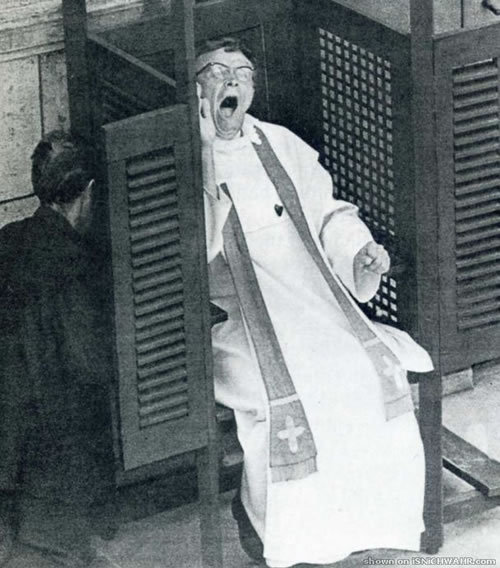Deprived of oxygen

Today I went to Confession. I try and go at the start of each month. I don’t know about you, but whenever that time rolls around, I almost always have an interior battle with myself:
“Do I really need to go to Confession? I mean, it wasn’t that long ago since I last went. It’s not like I’ve done anything that bad this last month. Wouldn’t it be better to wait until I’ve got something a bit more substantial to confess? After all, I don’t don’t want to waste the priest’s time with trivialities…”
Of course, sometimes the battle goes in the other direction:
“Ugh…it’s time to go to Confession again already?! I can’t believe how much I’ve messed up in the space of a few weeks. If I go, I’m going to have to re-confess everything from last time, plus a few extras. No, I really can’t go to Confession with my life in such a mess. I should wait until I’ve got things more under control…”
The problem with both of these internal monologues is that they both fail to recognize the grace available to us in the Sacrament of Confession.
As I was driving to the church today, I was reminded of a story told by Ravi Zacharias in Jesus among other gods, a work from which I’ve quoted quite in recent weeks. In the book Ravi tells the story of Andy Harris, a mountaineer who tackled Mount Everest. This adventurer unfortunately stayed too long at the peak and on his descent he started to get short on oxygen. He radioed the base camp to tell them the situation. In response they told him to use the oxygen tanks which he had in his pack. Unfortunately, by this time, the lack of oxygen had started to affect Andy, rendering him confused and disoriented, so much so that he was completely convinced that the tanks he had with him were empty. His friends begged him to use them, but resolute that they would be of no use to him, he refused. He died on the mountain.

What spiritual lesson can we draw from this tragic story? Without sanctifying grace in our lives, our minds and consciences become confused and disoriented. As we fall deeper into sin we only become more befuddled. The longer we remain in our diseased state, the harder it is for us to receive the medicine needed to effect a cure. Left untreated, we even begin to doubt the benefit of the medicine available to us, so much so that we spiritually die, all the while having the remedy within easy reach.
Advent begins today and I would invite you all to begin this time of preparation by going to Confession. In the days leading up to Confession you will no doubt experience something of the battle I described at the beginning of this post. Remain steadfast. There is grace in the Sacrament to help you in your walk with God. Trust in the power of the Sacrament given to us by Christ. Confess fully and truthfully without making excuses, “lest having come to the Physician, you depart unhealed”*. There is no sin you have committed which is too great for God to forgive.

 One of my favourite things about having a blog is that, every now and then, I’ll get an
One of my favourite things about having a blog is that, every now and then, I’ll get an 



